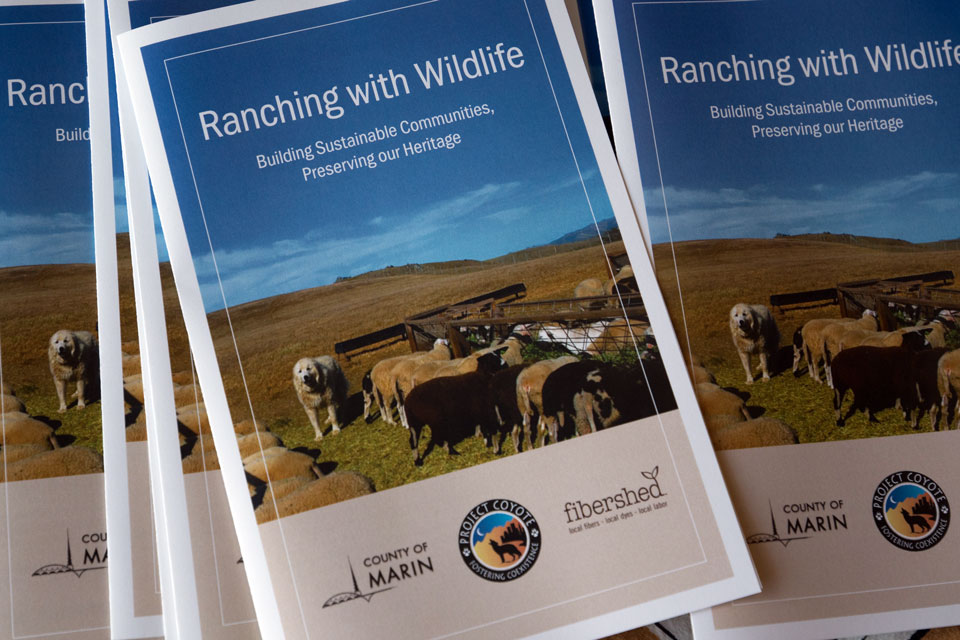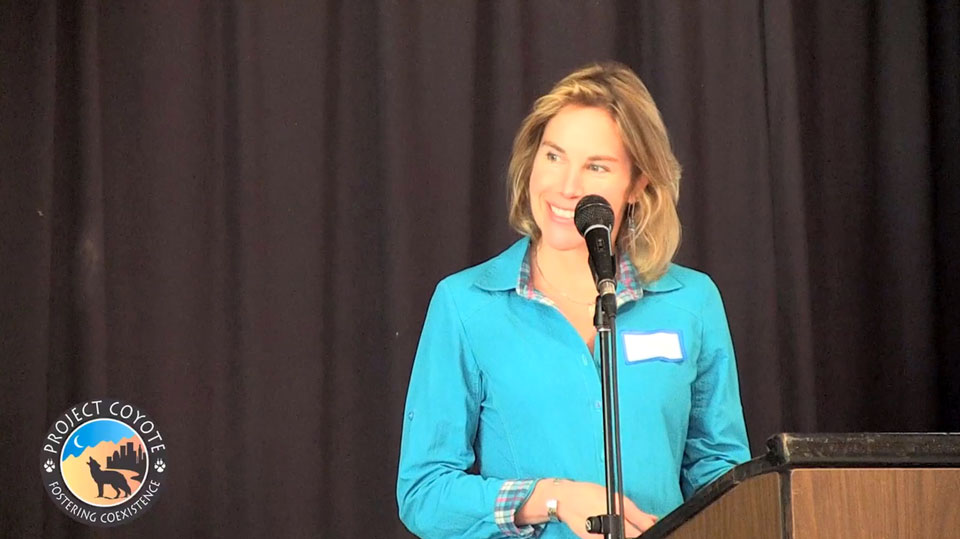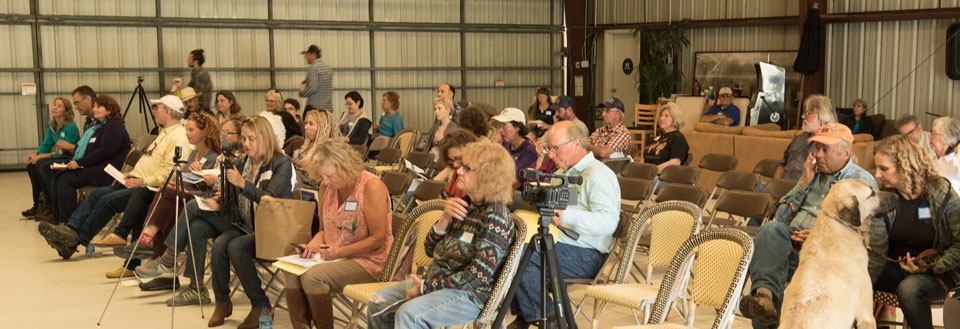

Project Coyote’s Founder and Executive Director Camilla Fox introduced presenters and screened Project Coyote’s short film trailer Finding Common Ground.
Topics at the workshop included the Marin Livestock and Wildlife Protection Program’s success as a cost share alternative to using USDA Wildlife Services’ lethal approaches; rancher successes with electric fencing, night corrals and guard dogs; insights and facts about carnivore behavior supported by conservation biology; and practical tips for preventing wildlife conflicts from a variety of experts.
WORKSHOP PRESENTATIONS

KELI HENDRICKS
Keli is a former professional cutting horse trainer who now devotes her time to rehabilitating wildlife as a volunteer for Sonoma County Wildlife Rescue, and helping people and wildlife coexist as the Ranching with Wildlife Coordinator for Project Coyote. Keli and her husband Dean live on the Bar C R Cattle Ranch where Dean has run the cow-calf operation for the past 24 years.
Read an interview with Keli in Project Coyote’s blog Notes From the Field.
STACY CARLSEN
Stacy has been the Marin County Agricultural Commissioner and Director of Weights and Measures for the past 20 years. He developed the Marin Livestock Protection Program, and he believes local, regional, and state governments play a critical role in advancing sustainable farming practices through education and appropriate funding programs. His work empowers large and small farms to improve biodiversity, protect livestock, improve soil quality, protect environmental quality, and improve employee work environments.
View Stacy’s presentation slides
REBECCA BURGESS
Rebecca is the Executive Director of Fibershed, and Chair of the Board for Carbon Cycle Institute. She has over a decade of experience at the intersection of restoration ecology and fiber systems. She has taught at Westminster College, Harvard University, and is the best-selling author of Harvesting Color, a bioregional look at natural dye traditions of North America.
View Rebecca’s presentation slides
MIMI LUEBBERMANN
Mimi moved to Windrush Farm in 1995, and with on-the-job training she began to raise long wool sheep for their fiber and meat. After a couple of coyote-free years, she was suddenly discovered by a hungry pack and had to learn what to do to keep her sheep safe. Through Stephanie Larson, she learned about the Marin Livestock and Wildlife Protection Program, and after learning a few tricks on llama management, has had great success with no further predation.
NICK CAVANAUGH
Nick and his wife Kim, are owners of Haven Ranch in Napa where they raise Katahdin sheep and Anatolian Shepherd dogs. Nick and Kim have been involved in dog behavior and training of all kinds for over 25 years.
DAN MACON
Dan and his family have operated a small-scale commercial sheep operation in the Sierra Nevada foothills for over 20 years. In addition, Dan is an assistant specialist in the rangeland program at the UC Davis Plant Sciences Department. His research and extension emphasis is on drought, water quality, and livestock-predator interaction.
View Dan’s presentation slides
DR. ROBERT CRABTREE
Bob is Founder and Chief Scientist at the Yellowstone Ecological Research Center and is a Research Professor at the University of Montana. He also serves on the Science Advisory Board of Project Coyote. His seminal work on coyotes—over a 30-year period—in central Washington and on Yellowstone’s northern range formed the basis for a new understanding of coyote ecology and their powerful demographic and behavioral response to human exploitation. He has challenged the ecological and economic validity of indiscriminate killing of coyote (and carnivore) populations. He has also conducted studies on wolves, foxes, bears, felids, mustelids and raptors and has more recently specialized in adaptive management by predicting the impacts of climate, human harvest, and land-use changes on species populations.
View Bob’s presentation slides
ROB HARRIS
Rob has been the General Manager and Director of Vineyard Operations for Price Family Vineyards since 2009. As such, he directs the viticultural operations and manages the winery client relationships for nine vineyard properties in Sonoma County, including the famed Durell and Gap’s Crown Vineyards. An agricultural economist by education and a grape grower by trade, Rob has more than 15 years of wine industry experience spanning multiple locations and growing areas of California, both as a part of large corporate organizations and small boutique operations. This breadth of experience has helped Rob develop a wide view of the industry and continues to allow him to steer his organizations with a broad understanding and a sharp focus on the art, the science, and the passion of high-level wine growing.
View Rob’s presentation slides
DORIS DUNCAN
Doris began rehabilitating wildlife as a volunteer in 1997. Now as Sonoma County Wildlife Rescue’s Executive Director, Doris has focused on creating innovative programs to support the wild animals in Sonoma County and the people they benefit. After years of rehabbing animals caught in traps, she was sick of the suffering and decided to get to the root cause of the conflicts. With the help of volunteers and staff, Doris has created the Predator Prevention and Education Barnyard Program (PEEP) as a way to aid the livestock community to find humane solutions to wildlife predation problems.
View Doris’ presentation slides
DR. KIM RODRIGUES
Kim is the Director for the University of California Hopland Research and Extension Center. Kim’s research areas of interest involve public participation in adaptive management and related collaborative work. As HREC Director, Kim is committed to applying collaborative adaptive management strategies in the management of the Hopland Research and Extension Center’s 5,300 acres. She is expanding research in all areas, with a specific focus on the living with wildlife while managing for sheep.
View Kim’s presentation slides
LEARN MORE
Learn about Project Coyote’s Ranching With Wildlife Program and non-lethal techniques.
Watch videos about coexistence principles and the success of the Marin Livestock & Wildlife Protection Program.
Learn more about USDA Wildlife Services.
Learn how Reforming Predator Management relates to ranching with wildlife.
Read about the 2016 workshop with a Q&A from Keli Hendricks.
Download and share resources about ranching with wildlife.
Workshop presentations by Eric Simon, Videographer
